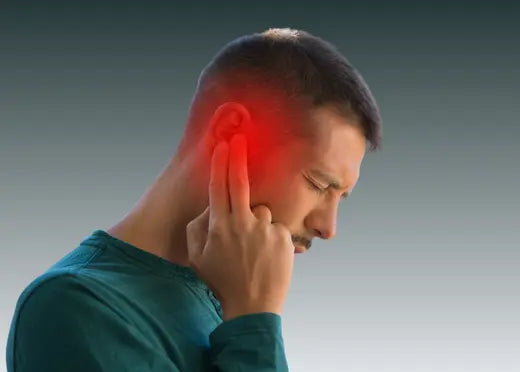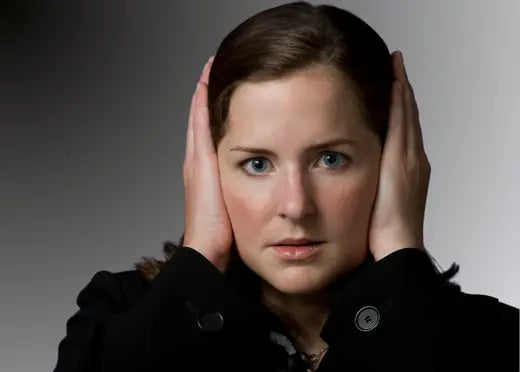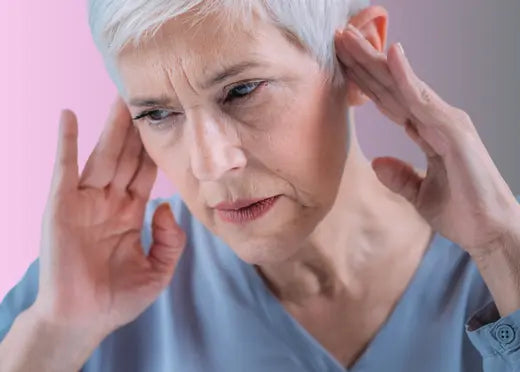Learn in detail about the possible causes of tinnitus, the different types of symptoms, and all available treatment options, from traditional medical solutions to new hearing technologies such as modern listening assistants. Also discover how hearing aid headphones can help alleviate some symptoms in everyday life.
The main causes of tinnitus
Noise exposure and noise trauma
Prolonged or repeated exposure to high noise levels (concerts, construction sites, loud headphones) can cause irreversible damage to the inner ear. This damage often results in chronic ringing. Acoustic trauma is now one of the leading causes of tinnitus, particularly among young adults and professionals exposed to noise.
Medical causes: ear disorders and diseases
Conditions such as chronic ear infections, Meniere's disease, temporomandibular joint disorders, and circulatory imbalances can cause tinnitus. In some cases, a simple buildup of earwax can be the cause of hearing symptoms.
Drug and toxic agents
Some medical treatments contain ototoxic substances, such as strong antibiotics, diuretics, or chemotherapy drugs. Exposure to solvents, heavy metals, or toxic chemicals can also impact the inner ear and trigger persistent tinnitus.
Stress and psychological factors
Chronic stress and anxiety disorders play a central role in the onset or worsening of tinnitus. A brain under constant stress can amplify the perception of internal noise. Fatigue, depression, and sleep disturbances often form a vicious cycle around this auditory symptom.
How to assess the severity of your tinnitus
The different types of tinnitus (tonal, pulsatile, etc.)
Tinnitus is divided into tonal tinnitus (continuous whistling), pulsatile tinnitus (paced by the heart), and other more complex forms. These distinctions allow for more precise diagnostic guidance.
Validated assessment scales and questionnaires
Tools such as the THI (Tinnitus Handicap Inventory) and the Khalfa questionnaire are used by professionals to quantify the impact of tinnitus. These scales help tailor treatments based on perceived intensity and functional repercussions.
Impact on quality of life and sleep
Tinnitus can disrupt sleep, cause frequent awakenings, and impair concentration in daily life. Many patients report chronic fatigue, decreased productivity, and relationship difficulties related to the constant noise heard in their heads.
Conventional medical solutions
Treatments for the underlying cause
Identifying and treating the underlying condition can sometimes eliminate tinnitus. This may involve removing earwax, treating an infection, or adjusting an ototoxic drug regimen.
Sound therapy and TRT (Tinnitus Retraining Therapy)
TRT is a proven approach that combines psychological counseling and prolonged exposure to neutral sounds. The goal is to desensitize the brain and relegate tinnitus to the background of auditory perception.
Drug approaches: current status
There is no specific cure. However, medications to treat anxiety, sleep disorders, or depression can indirectly reduce the intensity of tinnitus and improve overall well-being.
Hearing Aid Technologies and Tinnitus
Hearing aids with anti-tinnitus function
Some newer-generation hearing aids incorporate sound-masking features to treat mild to moderate hearing loss accompanied by tinnitus. These devices improve hearing while reducing the perception of internal noise.
White noise generators and tinnitus maskers
These devices emit a constant sound, often similar to a fan noise or a light whoosh, which helps mask tinnitus. They are available as standalone devices or integrated into connected earbuds.
Smartphone applications and digital solutions
Tinnitus management apps offer attention exercises, masking sound libraries, and personalized monitoring. They are often used in conjunction with a physical listening aid.
How listening assistants can help
Principles of masking and attentional diversion
Hearing aids selectively amplify relevant voices and sounds while reducing unnecessary background noise. This helps focus attention on the actual conversation rather than the background hissing.
The Spokeo solution for tinnitus
Spokeo offers unique dual-conduction technology (air + bone) that optimizes the clarity of useful sounds, even in cases of hearing loss or cognitive fatigue. Thanks to its intelligent microphone that captures only the speaker's voice, it helps people with tinnitus better connect to conversations and reduce the mental emphasis placed on internal noise.
Testimonials and case studies
Many users report noticeable improvements after adopting Spokeo: increased concentration, smoother communication, and reduced hearing fatigue. For the elderly or isolated, it's often a first step toward a better quality of life without the need for heavy or medical equipment.













